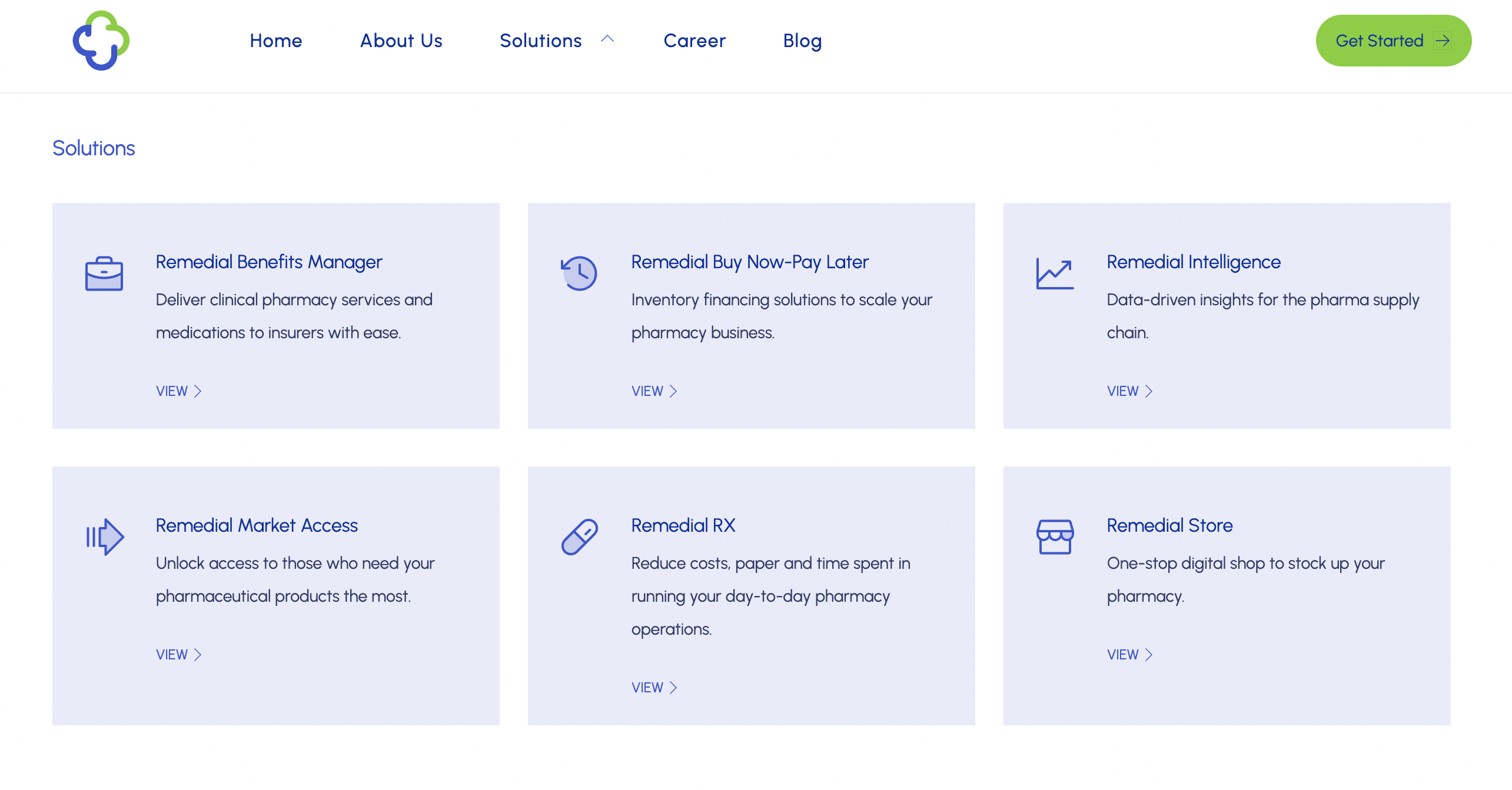Remedial Health has secured $1 million in pre-seed funding to digitize pharmacies, and stem the supply of fake and substandard pharmaceutical products, starting with Nigeria before expanding to the rest of Africa.
The round was led by Global Ventures and Ventures Platform, with participation from Ingressive Capital, Voltron Capital, Opeyemi Awoyemi’s (Jobberman co-founder) Angel Syndicate Fund, and other angel investors, including Flutterwave’s Olugbenga “GB” Agboola and Victor Asemota.
Part of the new funding will be used to extend the startup’s buy-now-pay-later (BNPL) offering, for an even wider reach.
Founded in 2020 by Samuel Okwuada, a trained pharmacist and self-taught software developer, together with his co-founder Victor Benjamin, Remedial Health started off as a private label business, focused on contract manufactured products from markets like India, which they would then sell to pharmacies in Nigeria.
“That business was pretty small. But at least we were in the market and we were growing,” said Okwuada, who pursued his MSc in Pharmacy at the University of East Anglia, in the UK.
Okwuada started his entrepreneurial journey while still at the university, where he built SaaS products, before using his experience in tech, and training as a pharmacist to launch Remedial together with Benjamin, a pharmaceutical field sales agent.
Months after starting the business, and due to a shift in market demand, and supply chain disruptions exacerbated by the Covid pandemic, Remedial Health started moving in a different direction — as their customers began making orders for products that were outside their private label offering.
To keep up with the emerging demand, and to streamline the ordering process, they developed a patient medication records (PMR) system that made sourcing easy, and digitized pharmacies.
Remedial Health’s system allows pharmacies to manage their operations, make and track orders – which the startup says it fulfills within 24 hours. The platform also stores patients’ medical records and supports reporting and accounting.
“For those using the system, because we can basically see their shelves, we are solving their supply issues by ensuring that they’re getting the products when they need them. And so they don’t have to go to the market and waste time by going through 20 to 30 individual distributors to buy all the medicines and supplies that they need.”
Aware that there is a market segment that will take a while to digitize, Remedial has an online shop that allows pharmacy owners not using its system to make orders through an app.
“We don’t force everyone to use the system because we don’t assume that every single pharmacy has a computer and constant power supply. And because we know that the major problem is supply, we make it possible for them to access the procurement system on their phones.”

Remedial Health’s system is stemming the supply of fake and substandard pharmaceutical products and helping pharmacies streamline their operations. Image Credits: Remedial Health
The system helps Remedial to conduct inventory monitoring, which cuts stockouts by redirecting products that are not moving in one pharmacy to where supply is short, or demand is high.
The startup has a main distribution center supported by hubs spread across its regions of operation for a faster turnaround time – making it possible to “reach any pharmacy from any of our hubs within an hour.”
Last mile delivery is done through its in-house logistics operation, or by its partners but the plan is to integrate its system with a major logistics player in Nigeria for a seamless end-to-end solution.
Remedial Health currently covers six states with plans to expand across the west African country, and to enter additional African markets before the end of the year. They are also planning to extend their reach in the regions that they are currently in.
Remedial, also part of the Winter 2022 cohort of Silicon Valley’s Y Combinator accelerator, sources its products from over 100 pharmaceutical manufacturers and suppliers, including GSK, Pfizer and Astrazeneca, as well as Nigeria’s Orange Drugs, Emzor and Fidson Healthcare.
To date, the startup has over 300 pharmacies making orders through its app, and a number of others using WhatsApp. It also extends credit to pharmacies with plans to expand the coverage of this financing service.
“The pharmacies don’t have to pay for products upfront; in some cases, they pay deposits, maybe 20%, and then pay the balance over time, but depending on how well we’ve known them, it can even be 100% financing.”
By extending financing and ensuring the supply of standard products to pharmacies, Remedial Health has joined the growing list of tech-enabled businesses that are digitizing the pharmaceutical supply chains, which currently remain fragmented and in-efficient, leading to the proliferation in markets of fake and substandard products. Other notable startups in the space are Kenya’s MyDawa, Ghana’s mPharma and Nigeria’s DrugStoc.
Remedial Health, according to its founders, is not just looking to correct the supply chain challenges only, but to do it while bringing primary healthcare closer to people.
“These pharmacies are less than a 15-minute walk from people’s houses, and I feel that is the way to transform healthcare in Africa –By adding diagnostic services, and a doctor to these neighborhood pharmacies — by literally bringing everything to the people, we would really transform healthcare in Africa,” said Okwuada.

